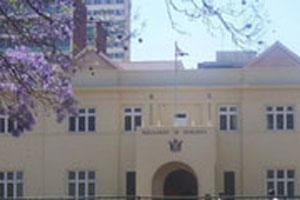
The Zimbabwe Human Rights NGO Forum on Friday elected a parallel structure to the commissions set up by the government as they believe the system authorities used was not accessible to ordinary people.
BY NDUDUZO TSHUMA
The organisation has been involved in the distribution of forms for the selection of candidates for commissions by inserting them in newspapers and depositing them into homes’ mail boxes.
Dzikamai Bere, a researcher at the Transitional Justice Unit of the Zimbabwe Human Rights NGO Forum, said civil society was turning on the heat regarding transitional justice in Zimbabwe.
“The idea of forming a working group came up at the two international conferences on transitional justice held in October 2012 and 2013 at which 48 organisations agreed on the need to push for the implementation of a comprehensive transitional justice policy for Zimbabwe to deal with past human rights violation,” Bere said.
“The Zimbabwe Human Rights NGO Forum has been spearheading this process. In February 2014, 37 organisations converged in Harare where they produced the roadmap to the working group. This working group will be charged with ensuring that there is justice for victims of past abuses and speeding the work of national reconciliation.
“It becomes the interface between transitional justice stakeholders and government official mechanisms like the Human Rights Commission and the National Peace and Reconciliation Commission. In other words, it is a shadow commission to all the official bodies that will deal with matters of justice in Zimbabwe.” Bere said the working group would have to hit the ground running owing to the current challenges associated with the establishment of the National Peace and Reconciliation Commission, a process started by Parliament which is currently being challenged by civil society. On Friday, the organisation held an elective meeting in Harare where eight candidates were voted to thematic areas. Bere said out of 46 invited organisations, 31 participated in the election, which produced members of the Transitional Justice Working Group for the respective thematic areas. Father Frederick Chiromba from the Zimbabwe Catholic Bishops Conference (ZCBC) was voted into the Promotion of Truth; Roselyn Hanzi of the Zimbabwe Lawyers for Human Rights (ZLHR) was nominated for Justice and Accountability. Alec Muchademana of Mbizo Muchademana and Partners was elected to the Reparations and Guarantees of Non-Recurrence while Reverend Ray Motsi of Grace to Heal Ministries was ushered into Memorialisation. Memory Kwachemba was voted to look at the Gender group while Anthony Reeler of the Research Advocate Unit, Pamela Machakanja from the Institute of Peace Leadership and Governance and Otto Saki from the Governance Resources Group were elected as independent experts. “We are grateful to Zimbabwe Election Support Network for successfully guiding the entire election process,” Bere said. “The interim committee will soon release an official communiqué outlining the way forward.” Bulawayo Agenda, the Zimbabwe Human Rights NGO Forum and 25 other civil society organisations (CSOs) on Wednesday petitioned Parliament challenging the nomination process of commissioners which ended on Friday. Parliament recently invited the public, in line with the new Constitution, to nominate people to be appointed as commissioners of the Zimbabwe Electoral Commission, Zimbabwe Human Rights Commission, Zimbabwe Gender Commission, Zimbabwe Media Commission and the National Peace and Reconciliation Commission.










